The Moon
An interview with Philip Ettinger about OCD, art, the creative mind, learning to trust the subconscious (even when it's out to get you).
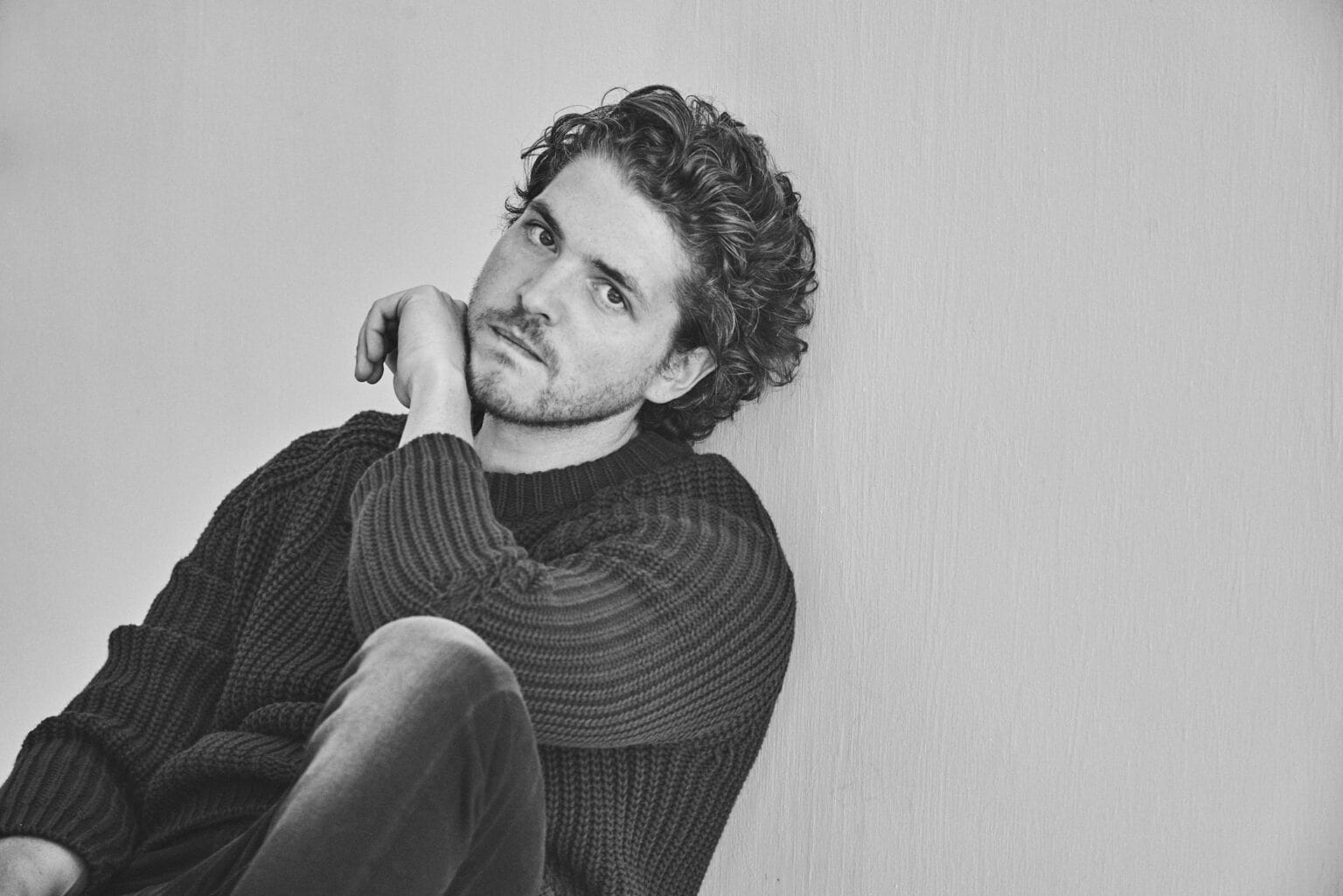
“The Moon’s soft light reveals hidden truths, verities in dire need of discovery. She offers clarity, but only if there is a willingness to go deeply within. she insists that intuition rather than rationale, be our guide through the inner shadows. She demands the release of the negative, and expects of us constructive and steady transformation. She reminds us to be aware of the difference between illusion and reality. The Moon itself symbolizes dreams, intuition, and the watery subconscious of the cosmic feminine. She asks us always to connect with the divine, the worlds beyond the veil, and to learn from nature, from the lessons in the cycle of waxing and waning.”
- Jessica Hundley, The Library of Esoteria TAROT
Playlist
The Moon is a card about the subconscious, dreams, inner turmoil and exploration. Like The High Priestess, The Moon offers us a knowing beyond language. When you get The Moon in a reading, you’re being asked to go deep, to listen to your dreams, to feel not think.
The subconscious can be a pretty scary place if, like me, you are totally fucking nuts. Though it seems obvious now, I can tie much of my drinking and other addictive behaviors to a desire to dull my brain enough to quiet my most intrusive thoughts. Sure, drunk sleep isn’t great for your morning, but isn’t worrying about dumb shit you might have said the night before better than the repetitive intrusive thought that you might have hit someone with your car and forgotten about it?
OCD is a toxic mixture of an overactive imagination and the primitive lizard brain. The obsessions prey on the part of the brain that believes that survival is contingent upon acceptance into the group, and so it loves to remind you of all the ways you’ve failed to fit in or act normal on any given day. OCD wants you to stay hyper vigilant at all times — I’m sure that the OCD cavemen survived because they were always worried about disease and being eaten by a bear while the rest of the group blithely enjoyed their nightly bonfires and never washing their shit-stained hands. [I’m no scientist, and though there are thousands of research papers on OCD, this is my thing, so I get to just speculate wildly instead of researching.]
Everyone has intrusive thoughts, but the OCD brain is like one of those glue rat traps. The more horrific the thought, the more easily it sticks. It’s hard to have a brain like that and not want to numb out. It has taken me literal years to get comfortable with my inner world. At first, I channeled every disturbing thought I had into writing. As long as I could create something from it, the horrific images playing on a loop in my brain were tolerable. But then I over-identified my mental illness as the source of my creativity. What if taking Zoloft (super effective at treating OCD, anxiety, and depression — I’m a triple threat with all three, NBD) meant that I’d stop being able to create anything at all?
OCD is a shame-eating demon, and it likes to strike while we are young and impressionable, while we are most acutely aware of what makes us different from everyone else. Here’s an incomplete list of all of my most shameful and horrifying intrusive thoughts:
- In spite of my lack of sexual experience, blood transfusions, or intravenous drug use, I definitely have HIV.
- The next 9/11 will be carried out by terrorists flying a plane directly into my dorm room in Watertown, CT.
- Because things are going well in my life, my brother will die this summer.
- If I do not imagine the plane crashing and everyone on board dying, the plane will crash and everyone on board will die.
- Because I imagined the plane crashing, the plane is definitely going to crash.
- Even though this definitely didn’t happen, I just ran over someone with my car and drove away.
- Under no circumstances can my right hand and left hand touch one another or I will become contaminated and die.
- If I get too happy or comfortable, someone I love is going to die.
- I am secretly a monster.
- I am secretly a sociopath (my therapist has had to tell me so many times: “People who are sociopaths don’t worry about being sociopaths.”)
- Everyone that I care about is mad at me.
I wish I could say that's the complete list. It's not. No, Friends. You wouldn't last a second in the asylum where they raised me.
The way out of the hellhole that is the OCD spiral is pulling these dark thoughts into the light. It took me years to admit to my therapist with teary eyes that I had intrusive thoughts about harming my kids. You cannot imagine the relief I felt when a therapist I trusted said, “That’s a very common OCD intrusive thought.” My darkest shame is typical! My deepest fears are felt by many! If only I had admitted these worries sooner!
Quitting drinking was a doozy, because all of those thoughts came flooding back. I didn’t realize that I had been so stressed, so under-slept, and that drinking had wreaked havoc on my sleep. When I finally started to dream again, I’d wake up sweating, overcome with fear or anxiety. When I started learning Tarot, I started reframing these messages from my subconscious. Tarot is all about tuning into a higher consciousness, one that you are not the sole author of, and one that connects you to the life force in every living thing. Tarot is about trusting that your subconscious has something to tell you, but in order to listen, you have to learn the difference between helpful messages and mental illness.
Recently, I zoomed with my dear and brilliant friend, Philip Ettinger, to talk about our shared experience with creativity and OCD. Philip is an actor who I first met doing my first professional theater production. He played a character named Ruckus in my play Edgewise. Ruckus is a teenager, all bravado and buffoonery. He’s a sneering asshole with a thirst for violence and a mean streak. He’s manipulative and conniving, but his antics are covering immense insecurity and fear.
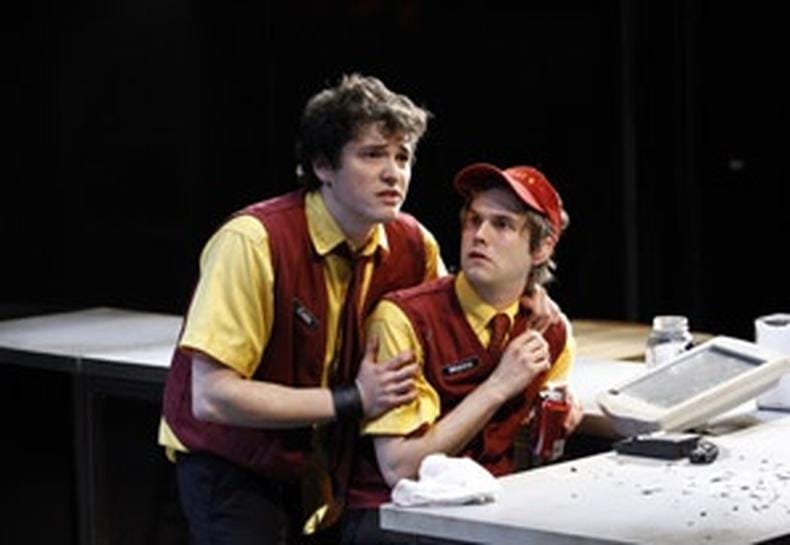
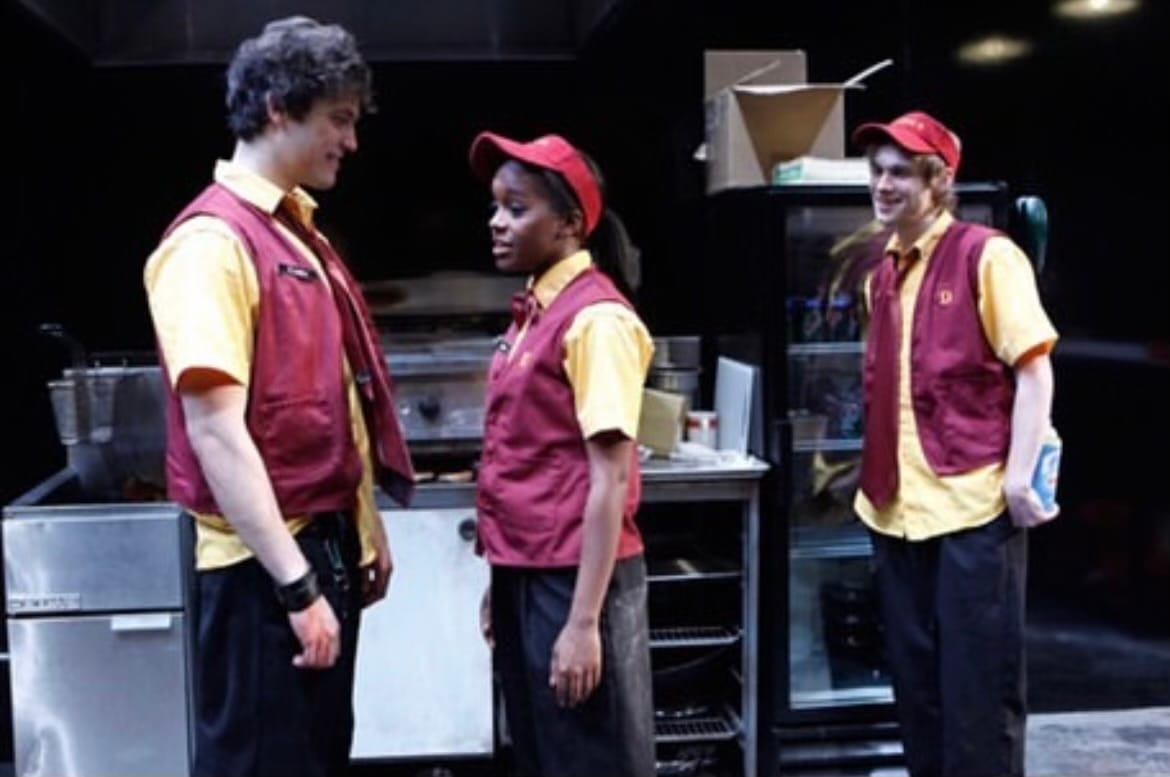
Philip Ettinger, Tobias Segal, and Aja Naomi King in Edgewise.
In my experience, asshole characters must be played by lovable people. If you cast someone who is also an asshole, you’ll wind up hating every second you have to watch that person. With this in mind, Philip was the type of actor who easily could have played Marco, the beta to Ruckus’s alpha, the sweet and quiet kid who ends up being pushed to violence but who, for much of the play, is just trying to protect the girl he’s got a crush on. Philip is not a Ruckus, and that’s why he was perfect.
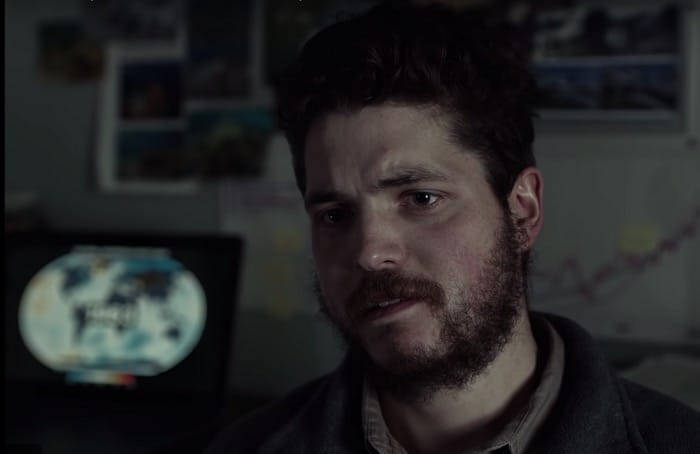
Philip is an adept and skilled actor, a dreamboat, and a deeply interesting, vulnerable, and sweet person. Since Edgewise, he’s done some incredible work, and it’s been really exciting to watch his career take off. We were just little artist babies together, and now look at him! He played identical twins, one with schizophrenia and one without, in the HBO adaptation of I Know This Much Is True, also starring Mark Ruffalo as the same characters but older.
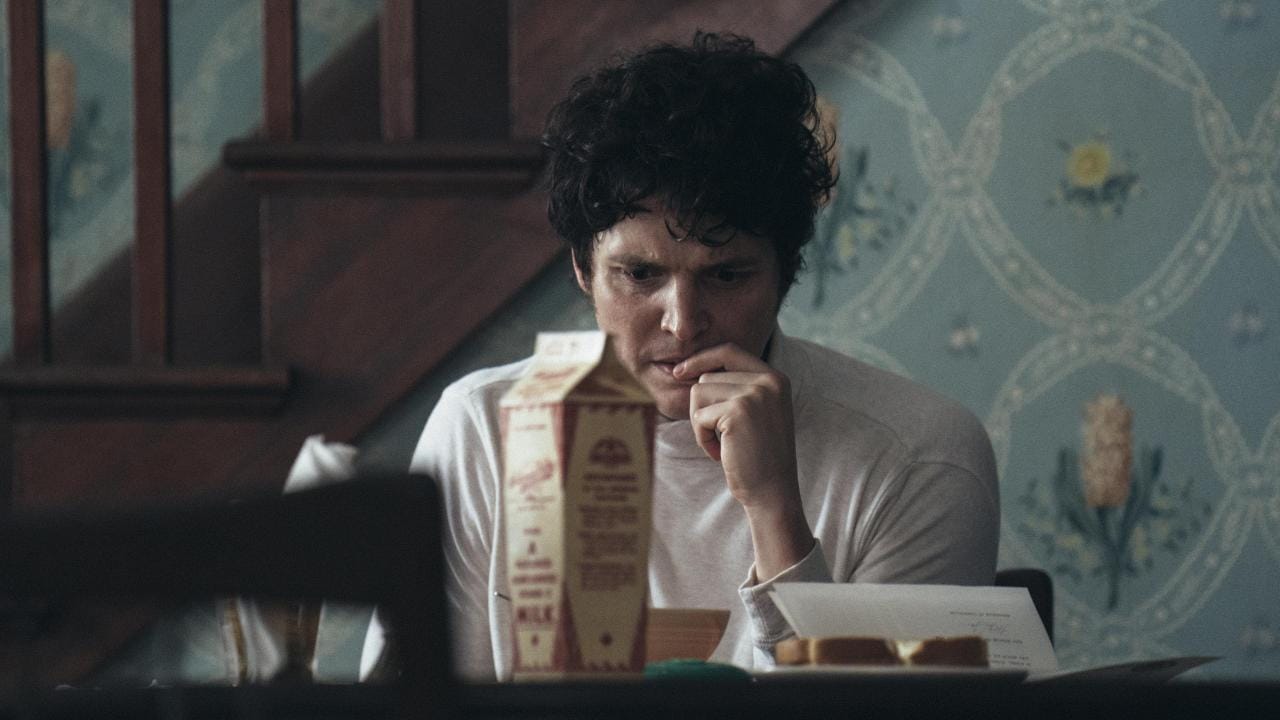
He plays a troubled environmental activist in Paul Schrader’s First Reformed, and can be seen in 2023’s Wildcat, written and directed by Ethan Hawke, plus a million other things.
Philip often finds himself exploring mental illness through the characters he plays, and we talk about that in this conversation, among other things. It has been condensed and edited for clarity. Enjoy!
Philip Ettinger: I’ve known you for so long. Did you always have all these tattoos?
Eliza Clark: No. I have so many because I stopped drinking, and I needed something else to feel alive.
Philip: Incredible.
Eliza: Also, I'm so blonde that I needed to edge myself up a little bit, but still, somehow even with a full sleeve of tattoos, I still look a little bit like I'm on a yacht just yachting around.
Philip: No, it's kind of edgy. You're just wearing something and then your sleeve slowly pulls up, and—
Eliza: And you're like, Whoa! Who's this?
Philip: Yeah, alright, cool.
Eliza: Anyway, thank you so much for doing this. The Moon, which is what this interview is loosely about, is all about creativity, intuition, the subconscious, and a bit about madness. I’ve been writing a lot about my experiences with OCD, and you’ve talked about your own OCD, so I thought we could talk about it together! When did you start noticing your own OCD thoughts?
Philip: I think I was like 8 or 9.
Eliza: Yeah. Me too.
Philip: It's the first time you realize the world feels out of control or not as safe as you thought it was. So it's just a way to cope, to gain some sort of semblance of control to get you through. And it actually serves a purpose for a long time, because it helps. You feel like you have some sort of control when things are out of control or scary. But then you build a set of habits on top of each other for decades. And then you're in your thirties and you're being run by this operating system you created when you're like nine years old.
Eliza: Right. An operating system from a time when you believed in literal magic.
Philip: Well, it's complicated because you can manifest things too. Like if you feel like you're gonna have a terrible night, you’re probably gonna have a bad night. And so often for me, even now I'll do a thing, maybe I'll wear the wrong thing, and I'll either have to change it, or if I don't, I'm like, I know that this won't directly cause something bad to happen, but now it's in my head. And now I'm gonna energetically make the bad thing happen. It's a vicious cycle, and then, there’s the shame spiral of being like this is so fucking stupid like why can't I not do this? But… I can’t not do this. I’ll get in my head, feeling like I’m mentally weak. So what do I do? Do I challenge myself, do I just ignore the impulse or do I do whatever it is my mind tells me I need to do? I know it'll be easier. I'll have a better day or night, but then I'm giving into it, and when does it ever stop if you keep giving into it? It keeps growing. I navigate this all day every day. I've gotten comfortable with it. I might come off as idiosyncratic or a little bit weird, but mostly I’m pretty good at hiding it.
Eliza: Are a lot of your compulsions internal? That's how mine are. I had a few rituals like checking, locking, washing, or whatever. But a lot of my rituals were in my head, so it was easier to hide.
Philip: For sure. My place right now is a fucking mess, I wish I had a thing about cleanliness, but for me, it’s more like everything that’s important to me is held hostage in my brain. My relationships, career, friends. So I’ll be walking in and out of rooms like tapping things maybe, it changes all the time what it is. If I do this and I have this bad thought in my head, then I have to do it again. Sometimes it's a word, and then I'll sit for a while and dissect the word. Is that word bad? Does that word have to be bad? Or, I have, for some reason, a thing about my socks and underwear. So I have a few close people in my life who I will text and be like “Just pick 1, 2, or 3.” They’ll just pick a number, and then that's the underwear I’ll wear. If I have to go to an event, I will just buy new socks and underwear. So I don't have to waste three hours choosing and be late to the thing.
Eliza: How do you know it's right? It just feels right?
Philip: It feels okay, like it's not even that it feels amazing. It just doesn't feel bad.
Eliza: Do you have intrusive thoughts? I’ve had, at various times in my life, fears about being contaminated, being infected with illness. Or if I have a disturbing thought, or I read about something horrific, I’ll think, “Oh, that’s me! I’m a terrible perpetrator of horrific crimes.”
Philip: Yeah, I mean, actually a really good friend of mine who is very successful… When his kid was young, he started having intrusive thoughts about harming his kid. It scared him so much, and he felt so bad about it that he couldn't even tell his wife. The only person he would tell is me, because he knew that I wouldn't judge him. And I was like “man that makes total sense — your biggest fear is hurting your kid. And so your brain is replaying the scariest thing for you. It’s not that you actually want to hurt your kid.” He couldn’t stop thinking about it. I think a lot of it was triggered by nerves and fear of having a kid for the first time.
Eliza: Sure. But also it's shame. That's one of the worst things about OCD. If you have a horrific thought — I’m gonna hurt my child, or I'm gonna do something horrible. And then you feel like you can't tell anybody that, because if they don't have the same brain as you, they will think that you're confessing something, and then, the minute you tell it to somebody who actually experiences the world the way you do, they’ll be like “Oh yeah, I’ve had that one” and suddenly it’s not shameful anymore. It loses it’s power.
Philip: In my career, I’ve ended up somehow navigating a lot characters with mental illness. I'm about to do another movie that also deals with some really intense stuff in a nuanced way. Luckily I really feel like my feet are rooted on the ground. But my brain definitely knows what it’s like to navigate mental illness. And listen, I don't think you have to be fucked up to be an actor, but I do think that there's certain things that I just innately understand. It's not even talent. I almost feel like it helps me, because I’m used to how my brain works, and now I get to help someone else feel less alone in the world. I have an obligation, I think, because I know that I can honestly portray mental illness. I guess that I'm able to let myself fully go to a place, and then, at end of the day, be okay.
Eliza: How do you create that boundary for yourself?
Philip: I don't really know! So, in I KNOW THIS MUCH IS TRUE… I would play the typical brother, and then I’d switch into Thomas, who's the schizophrenic brother, and I would just remove my shield. I would just completely let myself be and feel everything in a vulnerable way. It was pure instinct, impulse, reaction.
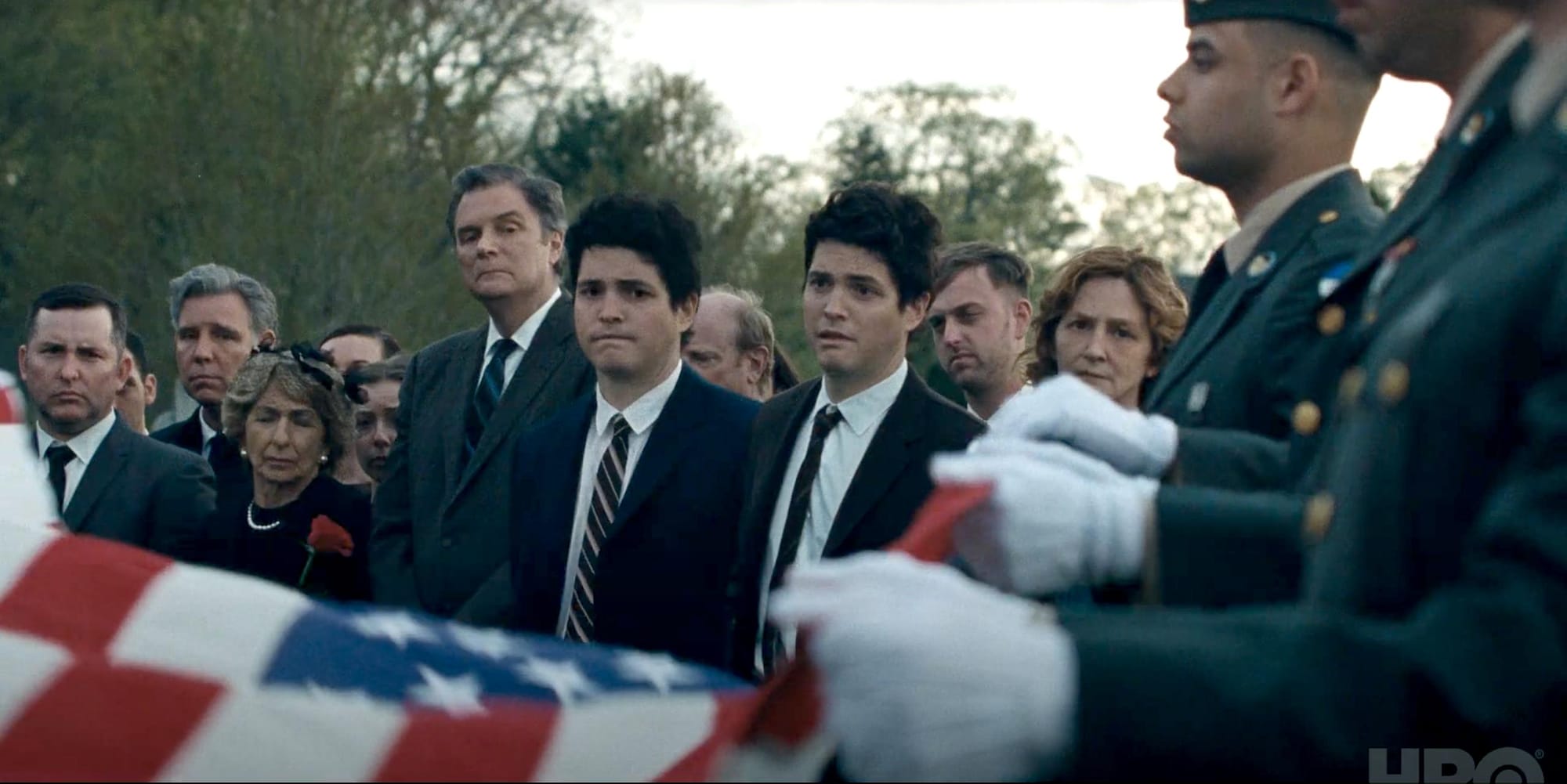
Eliza: Your performance in that show is incredible. You blew me away.
Philip: Thanks. A lot of it is improv, too, because I just kind of gave over to the character within a safe zone. Derek [Cianfrance, the director] is the master of creating a safe space. But, I don’t know, I don’t know how to describe it. I found the way to act in chaos. I'm so controlling in my life that I like to be out of control. I feel my safest when I'm out of control. If I'm really in a flow and acting, I have no idea what's about to happen next. I’ll sort of black out, which is a thing I've leaned into only in the past like 6, 7 years.
Eliza: That's cool, I mean scary, a little scary, but cool.
Philip: It's the only way I know how to do it, because I'm actually not good at performing…
(I make a face at him — he’s an excellent performer).
Philip: No, but I'm not… I’m just saying, it’s not my strength. When you’re in this business for a long time, you have to figure out ways to be the most uniquely you. For all of my twenties I was trying to do what my other friends do who are successful, but it's just not who I am. Once I just doubled down into my own sensitivity, or even insecurity, and just led with that… that’s when people tell me that my performance is “brave” or I’m really confident.
Eliza: Only in the last, like 2 years have I started to describe myself as an artist without barfing while I’m saying it, or rolling my eyes all the way back in my head. Being a creative person and making art for a living is such a huge privilege. But if you think of yourself as an artist, it gives you permission to figure out what your process really is. Because if you only think of yourself as a craftsperson, you end up following other people’s rules. “This is how you make a table, this is the only way to make a table.” I never really think of myself as a mentally ill person. Only in describing my various idiosyncrasies and diagnoses… “I’m a very sane person who has OCD, Depression, Anxiety, Alcoholism, and ADHD.” Turns out, um, actually, I have a very specific brain that has specific needs. I need to figure out how I'm gonna work in a way that allows me to enjoy the process and also enjoy my life.
Philip: Yeah. My dad heads schools for autistic kids and adults. I spent so much of my life working after school or summer jobs one on one with kids and adults with autism. I’ve realized and have seen that people can be overlooked or judged, but if you can speak their language, if you can find a way to connect… Every person is unique. Everyone has so much to offer.
Eliza: Your history has given you an opportunity to understand that brains don't have to be typical to be valuable or creative.
Philip: Yeah, and my brother, too. He's 13 years older. He went through a schizophrenic breakdown. I think I was like 9. He was 22. My parents moved him home, and they were building him an apartment in the basement, but for a year while they were building it, they put another bed in my room, and we were roommates. My brother, everyone was thinking he's completely just psychotic and crazy, but he was literally one of the only people who really saw me, and I was going through shit that people didn't know about and he was present. Even when he was feeling paranoid, it was usually coming from a seed or an impulse that he was feeling. That was true. From a young age I was like, this guy is the most sane person.
Eliza: So I won't dwell on this, but I just want to quickly go back to I KNOW THIS MUCH IS TRUE. Your performance is so beautiful, so specific. You're playing 2 different characters. But you're also playing a character who’s played by another actor — you and Mark Ruffalo play the same two characters at different ages. First of all, I saw you right after you’d finished that job, and I didn’t know you had just filmed that, and I was like, “Wow, I had no idea that Philip is actually a young Mark Ruffalo.” Mark Ruffalo is one of my favorite actors, how did I not see that Philip is Mark Ruffalo? You guys clearly mind melded, but your performance is not an impression of Mark Ruffalo. The way you’re talking about performing — how you completely let yourself go and black out, how did you use that intuitive process to play a character that was also played by another actor? Because you’re playing two fully three-dimensional people. It’s not an impression of Mark Ruffalo, and yet it’s so beautifully in sync with his performance.
Philip: Some of it is Kismet. You put out in the universe what you want, and you get it back.
Eliza: I want Mark Ruffalo.
Philip: No, I’m saying..
Eliza: Sorry, no that was me putting that into the universe for myself.
Philip: Mark and I, we’re kindred people. He’s another sensitive person by nature.
Eliza: You definitely have had a similar style and manner, even before you worked together.
Philip: YOU CAN COUNT ON ME is one of my favorite movies. For me, it’s Mark Ruffalo, Joaquin Phoenix, and Philip Seymour Hoffman. Those actors give performances I connect to and would strive toward. Not that I'm comparing myself to them.
Eliza: But they are really good comparisons.
Philip: I'm not good at impersonating anyone. So I just literally listened and watched every interview Mark’s ever done in his entire life, just like obsessive. I'm obsessive. So like obsessively over and over again, not trying to copy it, not trying to copy him phonetically or write anything down just like, listen. What I do is just sponge stuff up. But I was establishing the Thomas character first, because Mark did one side of the performance, and then he took off two months and gained like 60 pounds before playing the other side. We worked with this woman, and now I use this technique all the time. It’s dream work. You ask your inner self to show you something, to give you something, give you an answer in a dream. You could do it with writing too.
Eliza: Philip, this is so important for this card! Okay, keep going.
Philip: The woman we worked with, her name is Greta Seacat. I was wondering, how am I gonna play both these characters? I can’t change my look, because I’m going back and forth all the time. Anyway, I had this very visceral dream where the thing that was happening in the dream made my body react in a very specific way. It made my hand go up a little bit. I started walking around the room, playing every person in the dream, and Greta was like, I don't know what you're doing, but it's so specifically emotionally weird and intense that it seems right. But I didn’t want to paint Mark into a thing that I'm doing with this character, and she's like “I wouldn't worry about it, he’s having similar dreams.” So then I met up with Mark at this diner uptown. We were talking, and he's fucking awesome, we really are kindred. We're very similar in a lot of ways. He's someone who gets insecure and nervous and I'm that way, too. Before every job I'm like, “I can't fucking do this. I can't act at all.”
Eliza: I think that means you're actually really good. I've decided that’s an important part of the process.
Philip: I told him I was having these dreams, and he's like, “Let's go walk." And we walked like eighty blocks, and I showed him the physicality of what I was dreaming. And then he started doing it and then over the walk, we morphed it. We just came up with something. And what I love about these dreams is it creates something specific for me, because I'm so emo, a physicality is what connects me into the thing. The emotional fills in, but the physicality grounds me. I’ll dream about a really intense gesture. And then I start to walk around in it. It's not an intellectual thing, it’s physical. I don’t know where it comes from, it comes from my subconscious. So on I KNOW THIS MUCH IS TRUE, I would go play Dominic, but as soon as I changed into Thomas I would just ground myself in the physical gesture and it would click me in. For the show, the stakes were so high and the technical shit was so crazy, I just had to get out of my own way.
Eliza: It sounds like your process is deeply intuitive and about listening to your subconscious. I think about this all the time. Recently someone said to me “creativity and inspiration are also intrusive thoughts.” I've been cut off from my intuition for much of my life, because I was scared of my intrusive thoughts. How do you tell the difference between a helpful creative, inspiring intrusive thought and OCD?
Philip: Here’s what works for me: even if I’m doing something that is just a money job, I need to have some intense purpose that's deeper than any sort of ego, it needs to be something bigger than me. And if we're collaborating, I need to understand your purpose for making the thing on an emotional level, and connect to that, then ride that wave. We're all the same, we're all connected. We're all gonna die. With OCD, the intrusive thoughts can be scary because your reality is based on your own lens. I listen to both the OCD thoughts and my creative intrusive thoughts, which is a problem. If I let the intrusive thoughts get in my head, I have a hard time breaking through. I have to listen to my subconscious because it's so much smarter than I am. If I listen to it, I can make nuanced choices. But if I talk through the scene too much, often I end up sounding like I don't know what the hell I'm talking about, because it's in my body. I have to let myself do it because my subconscious will come up with something way more interesting than I can create in my brain. It’s like I’m a vessel, like I’m collecting energy and then I’m making a choice and I don’t even necessarily know what it means. I’ll watch and think, “why did I do that? That’s interesting.” Faith is important. Believing in something is a bold act. I have some sort of shit inside of me, and I've learned to, within the structure of a scene, let it come through. I just trust it and let it come through.
Eliza: I think part of why people tell you that your performances are brave is because most people don't show their emotions, especially men. I’m impressed that you’re so willing to be vulnerable. Because for me, OCD is very shame based. It’s hard for me to get out of my own way. I’m always doing so much mental math. I’m impressed by how deeply rooted in your body and your emotions you’ll allow yourself to be.
Philip: I don't know if you feel this way when you write, but I'm assuming at certain points you get in a flow, or you feel like the characters are talking to you. You stop thinking or judging what's happening.
Eliza: Yes yes. I’m always chasing that feeling.
Philip: I'm lucky. If I didn't find acting I don't know where the fuck I’d be. It would be bad, probably.
Eliza: When did you start?
Philip: I was studying film directing at Emerson College, and I saw a sign for an audition for a play, and I just walked to the audition. It was a play called Bang! Bang! You're dead! And it was about a school shooter who's haunted by the people he’s killed. I got the lead. I was the only non actor. And then I had all this fucking cathartic emotion come out of me, and I was like I don't know what's happening to me. I was so shut down and repressed until I was like nineteen. So when the play was over, I was like, I need to continue. So I did a William Esper studio class. It's all early Meisner. You're not acting. You're just kind of doing the activities. And I was just like emoting so hard, recklessly. The teacher there was like, “Hey, so you're in the A session. There's also a B session. If you just come in every day of the week we’ll comp you for the summer. I just wanna throw you up against people because you're not an actor, and you're just emotional.” I was just like fuck it. I was able to just rage and cry and fucking throw shit, and they loved it. I was like, this is crazy. And so at the end of the summer, I was supposed to go back to Emerson. It’s the week before school started, but my teacher tells me, “I talked to the head of the program at Rutgers. I'm a voice teacher there. They cast 18 people, but they'll see you Friday, if you can come in. Would you consider transferring schools?” And I was like, is it like this class? And she says Yeah, so I’m in. She asks if I can do Shakespeare. I'm like I've never done a monologue in my life. She tells me to find two monologues, even if they're contemporary, and meet her at Rutgers at 3pm on Friday. I do one monologue that's Jonathan Mark Sherman, WOMEN AND WALLACE. The second one, I completely blank so I just improvise. She's like, Okay, we've we've never done this, but fuck it. We're just gonna accept you into the school. But you need to do the first year over because you’re a mess. Anyway, that’s what I did.
Eliza: Whoa.
Philip: It was very hard for me. The whole process of Rutgers was hard, because then you had to do work, memorize lines, and then act.
Eliza: Right right. And you were like, I thought I was just getting to cry in front of people.
Philip: Yeah, exactly. The whole thing was completely impulsive. But for some reason, when I when I really do it, like if I stay as present as possible, when I'm on stage, I don't really have OCD. It’s just gone.
Eliza: That’s pretty amazing.
Philip: If I have a strong purpose, then it's not just about me. With I KNOW THIS MUCH IS TRUE, it wasn’t just an opportunity to play identical twins. I'm representing, in the most truthful way possible, schizophrenia, and what it's like to have a brother with schizophrenia. If I don't get out of my head, it’s offensive. It’s better if it’s not about me. That’s why I'm always so curious… Hopefully, I’ll have a kid at some point. I’m sure it brings up a lot of stuff. But I also imagine it’s less about you. You have to make sure this other person is okay.
Eliza: Parenting is a deeply humbling experience, especially when your kid struggles. It’s obviously horrible to watch someone you love suffer and not necessarily be able to help. But you also get an opportunity to to do things differently, to almost parent yourself. I remember being 8 or 9 years old and feeling so out of control, there was just always a mental churning of anxiety in the background for me all the time. It’s so nice to be able to say to my kids, “Everybody has weird, fucked up thoughts, and you don’t have to feel shame about it.”
Philip: Yeah, well, and also, if you're empathizing with them and being kind to them, then you have to be kind to yourself, which is beautiful.
Eliza: You do have to be kinder to yourself. It can be hard, because there's also so much shame in parenting especially motherhood. But when you’re telling a kid, “there's nothing wrong with you. You're okay. You're beautiful, you’re great just as you are…” it’s hard not to start applying that to yourself.
Philip: It's such a cliche, but the weird kids in high school are the ones that don't peak too early, you know? They bloom out of high school, and all the weirdness about them is what makes them interesting. Another thing… I don't even know if it's a part of this interview, or whatever but I’ve done ayahuasca. I know it’s silly to talk about—
Eliza: Dude. All I ever want to do is talk about mushrooms and psychedelics. PLEASE.
Philip: So that was a huge thing for me. As long as you're doing something with purpose, you're getting where you're going. You spend so much energy pretending you can control everything but you can’t. That was something that I was finally able to get my body to understand in a deep way.
Eliza: I've never done ayahuasca, but that was my experience of mushrooms. I understood that I’m connected to everything, and I have no control. And that’s okay. Almost every single time I’ve done mushrooms, the message I receive is “Quit striving, just be.”
Philip: In different ways, we are both ambitious and that's okay, too. But it’s like, take a swing and then let go, it’s out of your control. The only way I can really be in the moment is to not think about the final product. Success is me choosing to do this right now in this moment. I have to convince myself that it’s not even a film that’s gonna come out. It’s about this moment in this room right now.
Eliza: The most important way to stay sane in this business is to see the process as the thing unto itself. What happens to it when it's out of my hands is none of my business. I have to find my joy and purpose in the making of it.
Philip: For sure, and you can’t really judge success anyway. You can't judge your career until the end. Something might not turn out the way that you wanted it to turn out, but it could, in the scheme of your life be the greatest thing that could have ever happened. For FIRST REFORMED, shooting was chaotic, the camera broke, it’s a long story. I basically got two takes on my side to do this eighteen page scene. I had a conversation with myself. Because I had prepared but I had no time. Basically I could choose to push everything I had prepared and hope it came through, or I could just throw it all out the window and be truthful. The third option is I can just let this destroy me. The take that's in the movie is just me chucking everything I was doing out the window. I was just straight, truthful. And I learned a lot that way because people respond to that performance. It took me a long time to accept it. I learned that you can prepare so hard but everything's out of your hands, especially a role that requires you to listen and just be honest. You have no idea what the elements are gonna be until you're present across from the other person. You don't know what it’s gonna be, it can change last minute. Everything can change. Now I just lean into the chaos.
Eliza: It makes sense that it would take a long time to get to a place where you can trust yourself enough to be instinctive and follow your intuition, and just go with what's happening in the moment. You used to just be a boy crying in front of a class of actors.
Philip: There's so much of life that's inexplicable. I love basketball. And so many of the greatest athletes are really religious. I think maybe that’s about faith. It takes faith to believe that you can do something greater than your individual abilities. Why not believe that? Why not seek something? And if it helps you, you’ll be helped.
Eliza: For me, my lack of seeking came from fear, I think. And from a desire to control everything, to be a perfectionist. But honestly, it’s a superiority complex to believe that you uniquely understand reality. I don't know fucking anything! Turns out I don't have any clue. What happens after we die? I don't know! Being willing to admit that I have very little control leaves me open to a kind of earnestness that I used to hate. But now I’m finding earnestness to be more fun and more creative.
Philip: These days, earnestness is punk.
Eliza: I’m getting that tattooed.
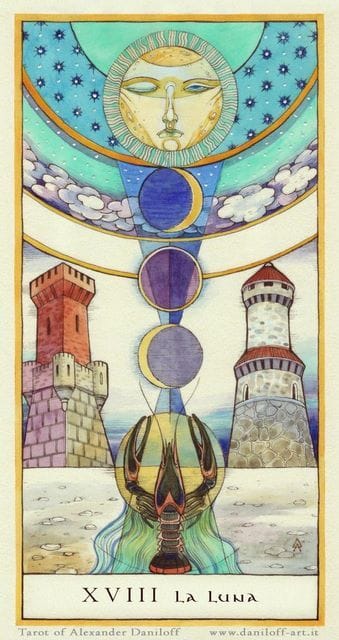
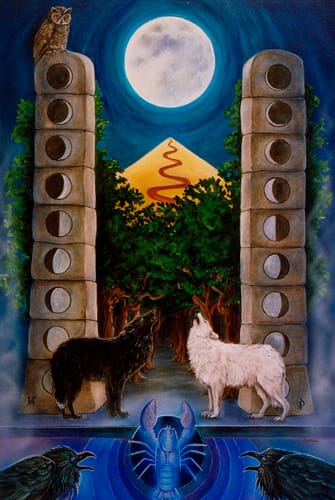

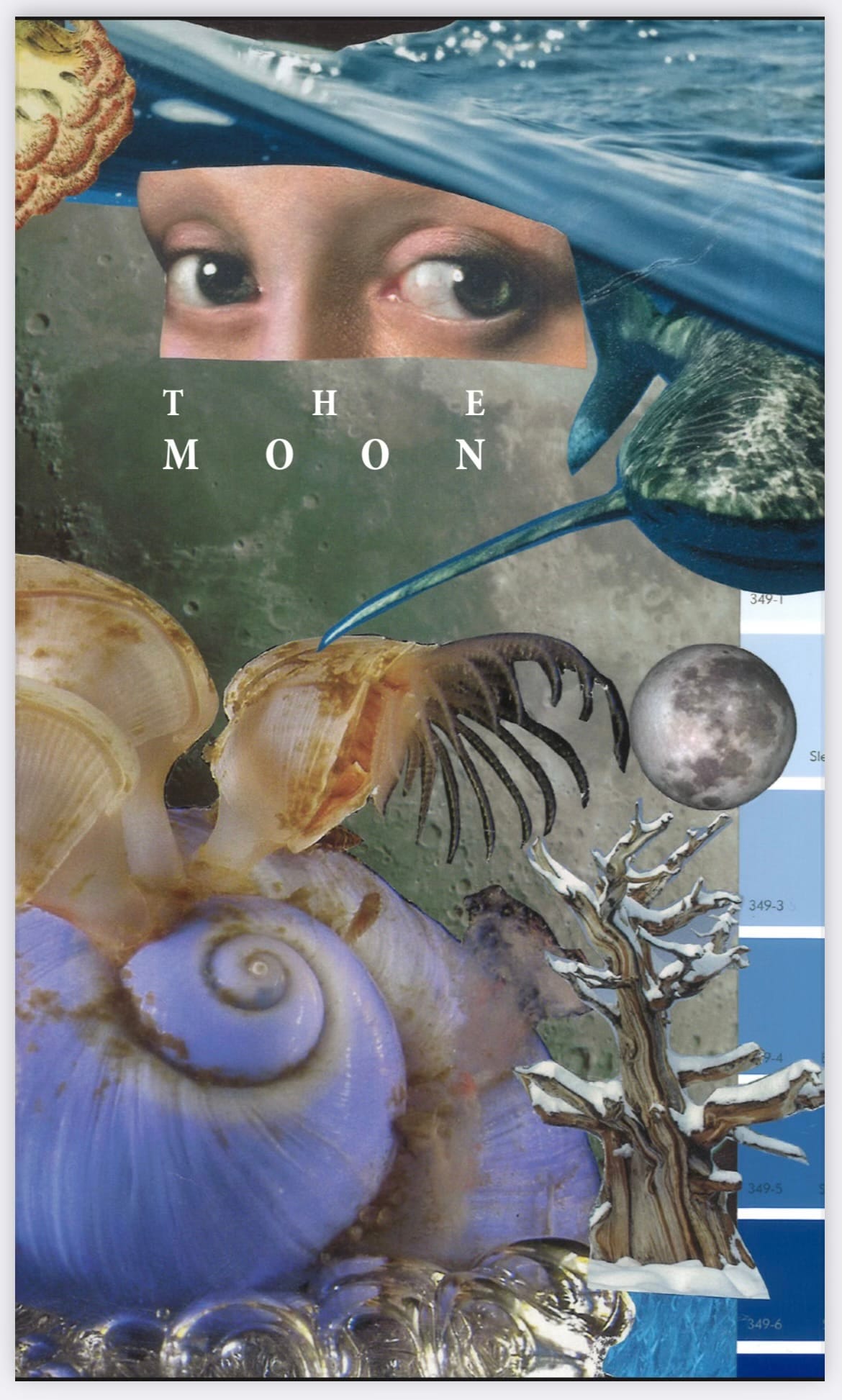
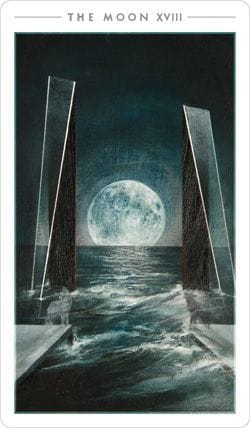
RECOMMENDATIONS
Inner Work: Using Dreams and Active Imagination for Personal Growth by Robert A Johnson.
Drawing Down The Moon: Witches, Druids, Goddess-Worshippers and Other Pagans in America by Margot Adler
The Best Minds: A Story of Friendship Madness and the Tragedy of Good Intentions by Jonathan Rosen. I loved this book – it's a heartbreaking, true story of two childhood friends, one who is schizophrenic and the other who is not. This book is about mental illness, but it's also about the complexities of friendship. Highly recommend.
